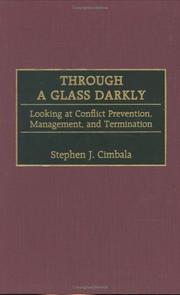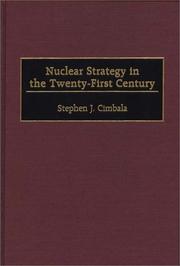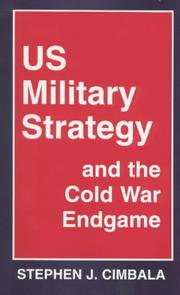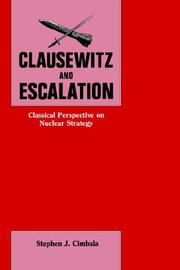
ISBN: 0313001030 9780313001031 0275971848 9780275971847 9798216025849 Year: 2001 Publisher: Westport, Conn. : London : Praeger, Bloomsbury Publishing,
Abstract | Keywords | Export | Availability | Bookmark
 Loading...
Loading...Choose an application
- Reference Manager
- EndNote
- RefWorks (Direct export to RefWorks)
Military policy --- Military history, Modern --- International relations --- Cold War. --- World politics --- Defense policy --- Military readiness --- Military history --- Sociology, Military --- War --- National security --- Political aspects --- United States --- Military policy.

ISBN: 9780313003677 031300367X 9780275968694 0275968693 0275968693 Year: 2000 Publisher: Westport, Conn. Praeger
Abstract | Keywords | Export | Availability | Bookmark
 Loading...
Loading...Choose an application
- Reference Manager
- EndNote
- RefWorks (Direct export to RefWorks)
The author of this study argues that nuclear weapons and the psychology of nuclear deterrence will remain important after 2000, but the character of that importance will change. Advanced technology conventional weapons based on information and electronics become more strategically important.
Book
ISBN: 1626376190 9781626376199 Year: 2017 Publisher: Boulder, Colorado: Lynne Rienner,
Abstract | Keywords | Export | Availability | Bookmark
 Loading...
Loading...Choose an application
- Reference Manager
- EndNote
- RefWorks (Direct export to RefWorks)
Nuclear arms control --- Nuclear arms control --- Nuclear weapons --- Nuclear weapons

ISBN: 0714641170 Year: 1995 Publisher: Ilford (Essex) Cass
Abstract | Keywords | Export | Availability | Bookmark
 Loading...
Loading...Choose an application
- Reference Manager
- EndNote
- RefWorks (Direct export to RefWorks)
Multi
ISBN: 9783030380885 Year: 2020 Publisher: Cham Springer International Publishing :Imprint: Palgrave Macmillan
Abstract | Keywords | Export | Availability | Bookmark
 Loading...
Loading...Choose an application
- Reference Manager
- EndNote
- RefWorks (Direct export to RefWorks)
This book analyzes the United States and Russia’s nuclear arms control and deterrence relationships and how these countries must lead current and prospective efforts to support future nuclear arms control and nonproliferation. The second nuclear age, following the end of the Cold War and the demise of the Soviet Union, poses new challenges with respect to nuclear-strategic stability, deterrence and nonproliferation. The spread of nuclear weapons in Asia, and the potential for new nuclear weapons states in the Middle East, create new possible axes of conflict potentially stressful to the existing world order. Other uncertainties include the interest of major powers in developing a wider spectrum of nuclear weapons and delivery systems, possibly for use in limited nuclear wars, and the competitive technologies for antimissile defenses being developed and deployed by the United States and Russia. Other technology challenges, including the implications of cyberwar for nuclear deterrence and crisis management, are also considered. Political changes also matter. The early post-Cold War hopes for the emergence of a global pacific security community, excluding the possibility of major war, have been dashed by political conflict between Russia and NATO, by the roiled nature of American domestic politics with respect to international security, and by a more assertive and militarily competent China. Additionally, the study includes suggestions for both analysis and policy in order to prevent the renewed U.S.-Russian nuclear arms race and competition in new technologies. This volume would be ideal for graduate students, researchers, scholars and anyone who is interested in nuclear policy, international studies, and Russian politics. Stephen J. Cimbala is Distinguished Professor of Political Science at Penn State University – Brandywine, USA. .
Politics --- Polemology --- politiek --- vrede --- Russia --- United States of America

ISBN: 0714634204 Year: 1991 Publisher: London : Cass,
Abstract | Keywords | Export | Availability | Bookmark
 Loading...
Loading...Choose an application
- Reference Manager
- EndNote
- RefWorks (Direct export to RefWorks)
Nuclear warfare --- Guerre nucléaire --- Clausewitz, Carl von,
Book
ISBN: 1626376425 Year: 2017 Publisher: Boulder, Colorado ; London, [England] : Lynne Rienner Publishers,
Abstract | Keywords | Export | Availability | Bookmark
 Loading...
Loading...Choose an application
- Reference Manager
- EndNote
- RefWorks (Direct export to RefWorks)
Does it make sense for the United States to cooperate with Russia to resolve international security issues? Is it possible for the two countries to work together to reduce the dangers associated with nuclear weapons? Where does Vladimir Putin fit into the calculus? Engaging the debate on these contentious issues, Stephen Cimbala provides context for and policy-relevant analysis of current US-Russian nuclear relations.
Nuclear arms control --- Nuclear weapons --- Government policy
Book
ISBN: 1626377200 Year: 2018 Publisher: Boulder, Colorado ; London, [England] : Lynne Rienner Publishers,
Abstract | Keywords | Export | Availability | Bookmark
 Loading...
Loading...Choose an application
- Reference Manager
- EndNote
- RefWorks (Direct export to RefWorks)
Can we avoid nuclear war? Why are we more at risk today than at the end of the Cold War? Can the world powers work together to ensure international stability? Stephen Cimbala provides a comprehensive assessment of these complex issues, ranging from the prospects for nuclear abolition, to the management of nuclear crises, to the imperative need for nuclear arms control worldwide.
Nuclear weapons. --- Nuclear nonproliferation. --- Deterrence (Strategy) --- Security, International.
Book
ISBN: 159797613X Year: 2010 Publisher: Washington, D.C. : Baltimore, Md. : Potomac Books, Project MUSE,
Abstract | Keywords | Export | Availability | Bookmark
 Loading...
Loading...Choose an application
- Reference Manager
- EndNote
- RefWorks (Direct export to RefWorks)
An in-depth assessment of Bush's military policy and defense strategy
National security --- United States --- Foreign relations --- Military policy.
Book
ISBN: 1569249865 Year: 1993 Publisher: New York Paragon House
Abstract | Keywords | Export | Availability | Bookmark
 Loading...
Loading...Choose an application
- Reference Manager
- EndNote
- RefWorks (Direct export to RefWorks)

 Search
Search Feedback
Feedback About UniCat
About UniCat  Help
Help News
News